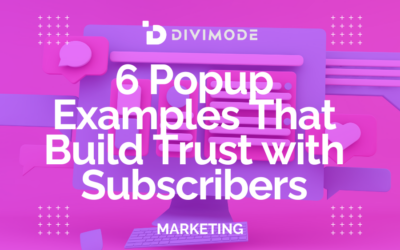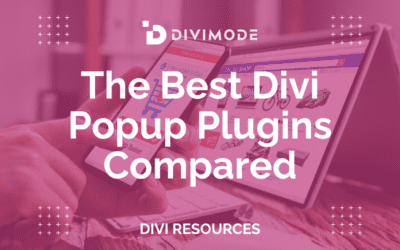Nowadays, in an AI-dominated era capable of producing words like magic on any give topic, the significance of popup power words that are carefully crafted on any topic almost instantly, the significance of each word often gets underestimated.
However, the truth is undeniable: quality impactful words drive sales, and this is especially true about popups, a conversion tool that has a fraction of a second in a moment when users browse to make an impact.
Powerful words can ignite curiosity, position your product as the solution for significant challenges, and effectively seal the deal in the process.
Recognizing this, we’ve compiled a list of impactful popup power words, complete with real-life examples demonstrating their effectiveness.
Table of Contents
- JOIN: HubSpot
- SIGN UP: Partake Foods
- OFF: Kinfield
- SUBSCRIBE: Kind Socks
- SAVE: Marlow
- START: CoSchedule
- GET: SmartBlogger
- EXCLUSIVE BONUS: Get Your Popup Masterclass Course FREE with Divi Areas Pro
- Wrapping Up
JOIN: HubSpot

The term “join” suggests becoming part of a group or community. This can be appealing as it taps into the human desire for belonging and connection. People often want to be part of a community, especially if it’s seen as exclusive or beneficial.
“Join” is a direct and clear call to action (CTA). The word carries positive connotations of unity, participation, and action. It implies that the user will gain something by taking this action, whether it’s information, benefits, discounts, or social connections.
Of course, the effectiveness of “join” in popups and other CTAs depends on the context and the audience. It works best when it aligns with the user’s interests and the value proposition of what’s being offered.
SIGN UP: Partake Foods

The phrase “Sign Up” is also a powerful tool in popups and digital marketing, and its effectiveness can be attributed to several factors.
“Sign Up” is a straightforward and unambiguous call to action. It clearly tells users what they need to do next, reducing confusion and streamlining the decision-making process. This clarity can increase the likelihood of users taking the desired action.
The process of signing up is often perceived as the first step in a longer journey or engagement with a service or product. This can create a sense of commitment and begin the process of user involvement and brand loyalty.
Similar to “Join,” the phrase “Sign Up” is versatile and can be used in various contexts, making it a useful phrase in different types of marketing campaigns. It tends to work well when the value proposition is clear, and the user perceives a benefit from signing up.
OFF: Kinfield

In marketing, the word “OFF” is often used in conjunction with numbers to indicate a discount (e.g., “10% OFF”). This association with savings can be a strong motivator for consumers, as it appeals to their desire to get a good deal or save money.
Visually, the word “OFF” often stands out in advertising material, especially when paired with striking colors or bold fonts. This contrast can grab attention and make the offer more noticeable.
The prospect of getting something for less than its regular price (what “OFF” implies) can be psychologically appealing. It can make the purchase seem more justifiable and the product more desirable.
SUBSCRIBE: Kind Socks

The word “Subscribe” is another powerful term in the context of popups and digital communications. Unlike “Join” or “Sign Up” which might imply a one-time action, “Subscribe” often suggests a longer-term commitment. This can be beneficial for businesses looking to build a sustained relationship with their audience.
“Subscribe” usually implies that the user will receive regular updates or content, such as newsletters, magazines, videos, or podcasts. This promise of ongoing value can be a strong motivator for users who are interested in the subject matter.
When users subscribe to a service or publication, there’s often a perception that they’re investing in quality content or products. The act of subscribing can imply a higher level of quality or credibility compared to free or one-off offerings.
SAVE: Marlow

The word “Save” holds significant power in the context of popups. “Save” is often associated with financial benefits, such as saving money on a purchase. This can be a strong motivator, as consumers are generally attracted to the idea of getting more value for less money.
Similar to “OFF”, the word “Save” can create a sense of urgency, especially when used in limited-time offers or sales. It implies that by acting now, customers can prevent missing out on savings, which can drive quicker decision-making and action.
Save” is a simple, clear word that is instantly understood by most people. In marketing communications, simplicity and clarity are key to effectively conveying a message and prompting action.
START: CoSchedule

The word “Start” is a compelling choice in popups because it is an action-oriented word that signifies the beginning of something. This can be motivating as it suggests taking the first step towards a goal, project, or experience. It’s a powerful call to action that encourages users to initiate a process or engage with a service or product.
Compared to terms that might suggest a long-term commitment, like “Subscribe” or “Buy”, “Start” often implies a lower level of commitment, which can reduce the perceived risk and make users more willing to take the initial step.
It tells the user exactly what to do, reducing confusion and decision-making time. It’s straightforward and direct, which can be very effective in prompting immediate action.
GET: SmartBlogger

“Get” is a straightforward, action-oriented command. It prompts an immediate response and clearly tells the user what action to take. This directness can be very effective in driving user engagement.
The term inherently implies acquiring or gaining something, which can be a strong motivator. Whether it’s “Get Your Free Trial,” “Get 50% Off,” or “Get Started,” the idea of gaining something of value can be very appealing.
This word can convey a sense of urgency and immediacy, especially when used in limited-time offers or exclusive deals. It encourages users to act quickly to obtain the offered benefit.
EXCLUSIVE BONUS: Get Your Popup Masterclass Course FREE with Divi Areas Pro

Transform your Divi website with Divi Areas Pro — and master popups! As a bonus, when you purchase our innovative popup plugin, you’ll gain FREE access to our exclusive Popup Masterclass Course.
This comprehensive course is designed to skyrocket your digital marketing skills, teaching you insider secrets on crafting high-converting popups that captivate and convert.
🌟 What You’ll Get:
- Divi Areas Pro: Elevate your website’s user experience with cutting-edge popup technology.
- FREE Popup Masterclass Course: Learn from industry experts on how to create compelling, action-driven popups that resonate with your audience.
💡 Unlock the Secrets to:
- Crafting irresistible calls to action.
- Utilizing psychological triggers effectively.
- Designing popups that seamlessly blend with your site’s aesthetic.
- Analyzing and optimizing popup performance for maximum impact.
Don’t miss this golden opportunity to enhance your digital marketing strategy and engage your audience like never before. Start your journey to popup mastery today!

Try Divi Areas Pro today
Sounds interesting? Learn more about Divi Areas Pro and download your copy now!
Many pre-designed layouts. Automated triggers. No coding.
Click here for more details
Wrapping Up
In conclusion, the power of carefully chosen words in popups and digital marketing cannot be overstated. Words like “Join,” “Sign Up,” “OFF,” “Subscribe,” “Save,” “Start,” and “Get” each carry their own unique weight and influence in guiding user behavior and decision-making.
Each of these words, when used effectively, can significantly enhance the appeal of a call to action. They tap into psychological triggers, encourage users to respond, and can ultimately lead to higher conversion rates. The key to their success lies in their ability to convey a clear, compelling message that aligns with the users’ interests and needs.
In crafting marketing messages and popups, it’s crucial to choose words that not only attract attention but also resonate with the audience, creating a sense of urgency, exclusivity, or benefit. By leveraging these power words, you can effectively guide user behavior, enhance user experience, and ultimately drive conversions and engagement.






